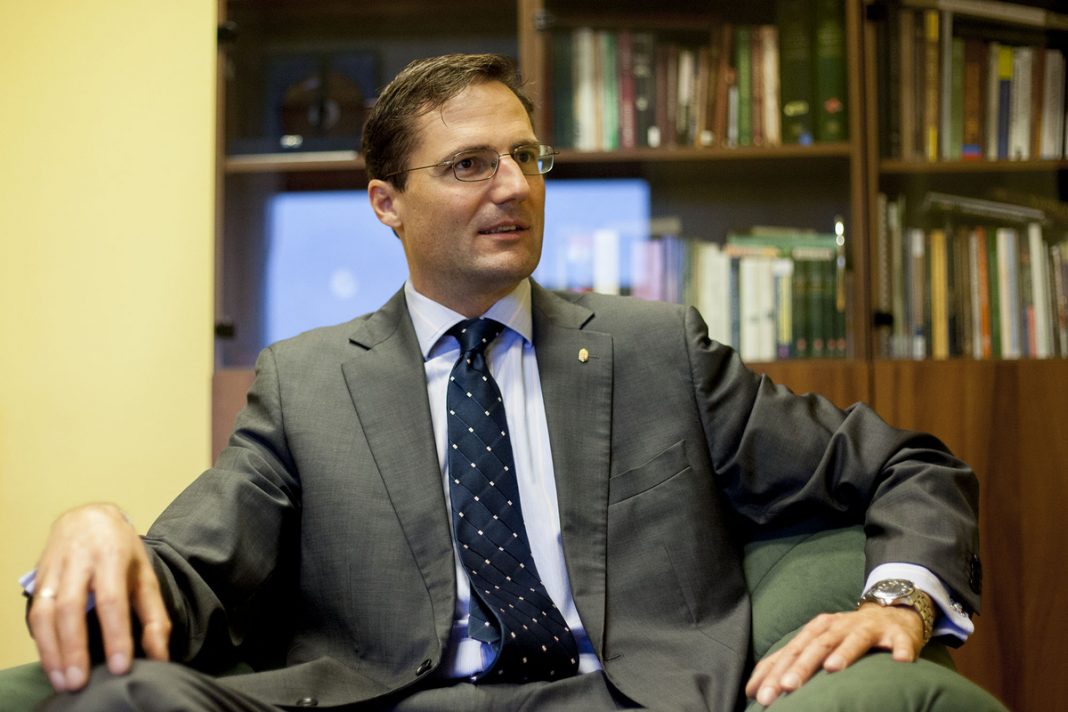Márton Gyöngyösi este vicepreședintele executiv si liderul grupului parlamentar al partidului ungar Jobbik. De asemenea, domnul Gyöngyösi a fost responsabil de conturarea agendei Jobbik în cea ce privește politica externă. În acest interviu exclusiv pentru 45north, Márton Gyöngyösi explică rezultatul ultimilor alegeri parlamentare, situația democrației în Ungaria, precum și viziunea sa asupra unor subiecte precum administrația Trump și acordul nuclear iranian.
Interviul a fost realizat de Dragoș Tîrnoveanu, fondator 45north.
Pentru varianta în limba engleză, click aici. For English, click here.
45north: Domnule Gyongyosi, în primul rând, felicitări pentru noua funcție de vicepreședinte executiv al partidului și lider al grupului parlamentar. Ultimele luni au fost pline de evenimente pe scena politică din Ungaria. În urma rezultatului alegerilor parlamentare, care credeți că a fost principalul motiv pentru care Fidesz a reușit să își mențină majoritatea de două treimi în parlament și, retrospectiv, ce ați fi putut face diferit pentru a preveni sau îmbunătăți acest rezultat?
Márton Gyöngyösi: Vă mulțumesc. Este adevărat că situația actuală nu este una ușoară pentru Ungaria. Guvernul a obținut iarăși o majoritate de două treimi, iar mulți cetățeni se întreabă cum a fost posibil acest lucru. Totuși, dacă este să luăm în considerare ceea ce s-a întâmplat în Ungaria după 2010, putem observa o serie de măsuri care au condus către acest rezultat. De fapt, nu este chiar atât de dificil să obții o majoritate de două treimi, atât timp cât sistemul electoral a fost schimbat în unul care avantajează partidul aflat la guvernare, prin acapararea mass-mediei, închiderea programelor media alternative și preluarea controlului direct asupra instituțiilor de stat. Înainte de aprilie 2018 credeam că trăim într-o – deși nu perfectă – democrație. Acum știm că trăim într-un regim hibrid.
Faptul că de la ultimele alegeri, ultimul ziar și post radio de opoziție au fost închise, ultimul canal TV de opoziție a fost preluat iar noii manageri sunt instruiți direct de către guvern și Fidesz, arată că spațiul pentru activitățile politice clasice este redus semnificativ. De aceea, este nevoie să ne pregătim pentru rezistență. În calitate de ultim partid al opoziției, este de datoria noastră să rezistăm și să preluăm conducerea pentru toți cetățenii care doresc să trăiască într-o țară liberă. Trebuie să găsim noi metode, venite chiar și din interiorul parlamentului, și să facem ceea ce se așteaptă de la o mișcare de rezistență să facă.
45north: Însuși Jobbik a trecut printr-o perioadă tulbure în urma acestor alegeri, un grup semnificativ de membri criticându-l pe domnul Vona și direcția sa moderată pe care a imprimat-o partidului. Va fi oare aceasta moștenirea lăsată de domnul Vona – un partid mai moderat dar și fracționat? Credeți că această facțiune a partidului va evolua, devenind un pericol la adresa Jobbik?
Márton Gyöngyösi: În ultimii cinci ani, Jobbik a trecut printr-un proces de transformare, devenind un așa numit partid popular. Ne-am schimbat și ne-am distanțat de ceea ce era văzut adesea drept extremism, atât în interiorul Ungariei, cât și în afara ei. Ultimele alegeri demonstrează faptul că am avut dreptate făcând această alegere, întrucât am putut fi votați de către un electorat mai divers din punct de vedere social.
În același timp, trebuie să observăm faptul că Viktor Orbán și Fidesz doresc controlul total asupra fiecărui aspect al vieții în Ungaria. Pentru a atinge acest obiectiv, ei au pătruns deja în structura internă a câtorva partide ale opoziției. Este evident faptul că după alegeri, Jobbik a fost singurul partid cu o structură națională care nu este înțesată de agenți Fidesz. Asta nu înseamnă, bineînțeles, că propaganda guvernului, amenințările sau promisiunile, nu au avut vreun efect asupra niciunui membru din Jobbik. Cu toate acestea, partidul nostru a fost îndeajuns de puternic să reziste acestora, iar toți cei care au dorit să lege în vreun fel politicile noastre de Fidesz au părăsit organizația. Ei deserveau interesele guvernului, așa cum a fost vizibil în ultimele zile ale ședințelor parlamentare, unde aceștia au votat întotdeauna împreună cu Fidesz.
În același timp, nu cred că trebuie să ne temem de ei. Jobbik este un partid stabil, așa cum o demonstrează ultimul nostru congres, în cadrul căruia am adoptat un nou manifest pentru o țară liberă, corectă și sigură.
45north: Raportul Sargentini a zguduit deja fragila Uniune Europeană, reprezentând a doua ocazie când Articolul 7 a fost invocat și îndreptat împotriva unui Stat Membru. Ați ieșit public și ați afirmat că raportul conține ”nenumărate minciuni”, că acesta ar fi o ”farsă”, dar, în același timp, ați declarat că nu puteți ”nega aspectele raportului privitoare la statul de drept”. Cum ați răspunde criticilor conform cărora alegeți preferențial concluziile și recomandările raportului?
Márton Gyöngyösi: Nu cred că reprezintă o alegere preferențială faptul de a afirma că intențiile originale ale raportului, anume de a scrie un raport critic cu privire la statul de drept în Ungaria, au fost juste însă, din păcate, doamna Sargentini nu a putut să privească și în afara contextului liberalilor vestici. Aceasta a făcut acuzații grave la adresa poporului ungar. Trăiesc în Ungaria și pot spune că ceea ce a scris despre anti-semitism și rasism pur și simplu nu este adevărat, iar prin aceste afirmații nu a făcut altceva decât să îl ajute pe Orbán, care poate acum să vorbească despre astfel de probleme, în loc să ofere un răspuns la întrebările majore ale societății. Nu este numai părtinitor, ci și contraproductiv din partea doamnei Sargentini, întrucât sunt multe altele de spus despre lipsa democrației în Ungaria.
45north: Ați criticat faptul că perspectiva părtinitoare a lui Judith Sargentini reiese și în recomandările sale privitoare la politicile de migrație. Este politica dumneavoastră în domeniul migrației asemănătoare cu cea a Fidesz și dacă nu, cum vă diferențiați în această privință?
Principala diferență ar fi că noi dorim să rezolvăm problema migrației. Orbán nu dorește să facă acest lucru, ci să beneficieze de pe urma ei. Dacă această problemă ar fi rezolvată odată și pentru totdeauna, el ar fi în pericol politic, întrucât ar trebui să vorbească despre emigrarea masivă din țara noastră, deficitul forței de muncă, problemele serioase din sistemul nostru de sănătate și prăbușirea așteptată a sistemului de pensii. De aceea el se folosește de aspectul migrației drept un scut politic. Orbán nu are o temere mai mare decât rezolvarea problemei migrației și o poziție fermă europeană în ceea ce privește protejarea frontierelor. Acesta este motivul pentru care și-a schimbat părerea, acum că Europa dorește să desfășoare Frontex la granițele care nu sunt protejate în prezent îndeajuns de bine. De aceea el – nu știu un cuvânt mai nimerit pentru asta – trolează acordul Uniunii Europene, încheiat cu guvernele africane, pentru oprirea valurilor de imigranți venite dinspre Africa.
Contrar lui, noi suntem interesați în găsirea unor posibile soluții. Este clar că un zid de 170 de kilometri în inima geografică a Europei nu ne va apăra de această tendință globală. Milioane de oameni e posibil să își părăsească casele și să vină în Europa. Obiectivul nostru este de a-i face pe aceștia interesați să rămână acasă. Bineînțeles, Ungaria nu va reuși să realizeze acest lucru de una singură. De aceea avem nevoie de o Europă puternică capabilă să își protejeze frontierele, dar în același timp capabilă să ajute Orientul Mijlociu și statele africane să își păstreze populațiile acasă. Credem că o revizuire a politicilor vestice de asistență este necesară pentru a atinge acest obiectiv. Sperăm ca odată ce reușim aceasta, nimeni nu va mai fi forțat să își părăsească țara din motive economice sau politice, fie că această țară este Ungaria sau Nigeria.
45north: Ați afirmat că programul de rezidență Fidesz ”a lăsat liberi în Europa jumătate din rețeaua de agenți de informații ruși și jihadiști musulmani.”Ați putea să elaborați pe marginea prezenței rusești în Budapesta și cum acest program a facilitat acest lucru? Ce intenționează să facă Jobbik pentru a pune capăt influenței rusești în țară?
Márton Gyöngyösi: Rusia a fost și va fi întotdeauna o întrebare, o provocare și o oportunitate pentru Ungaria. În cadrul partidului Jobbik, întotdeauna am promovat relații bune, echilibrate cu Rusia. Nu este un aspect legat de simpatie, ci este pur și simplu necesar deoarece suntem apropiați unii de alți din punct de vedere geografic. În egală măsură, ceea ce se petrece acum la nivel guvernamental este ceva diferit, deși de înțeles. Din moment ce Orbán este din ce în ce mai izolat în Europa, el caută noi parteneri, iar unul dintre ei ar putea fi Rusia. Din păcate, și acest lucru se întâmplă în stilul Orbán, cu transparență nulă și o mulțime de elemente dubioase. Lipsa de transparență în cadrul înțelegerii cu privire la uzina nucleară Paks, precum și vânzarea dreptului de reședință către oameni de afaceri ruși bine poziționați precum și agenților de informații ruși reprezintă exemple bune pentru această direcție. Din nou, membrii guvernului ungar au fost mai interesați de a obține bani decât de a-și apăra țara. Această abordare ipocrită este caracteristică guvernului.
45north: Ne aflăm aproape de încheierea a doi ani de administrație Trump. V-ați abținut în a emite comentarii privind politicile domnului Trump și direcțiile sale generale în conversațiile noastre private. După acești doi ani, aveți o analiză mai bine conturată despre cât de benefică sau nu este președinția sa pentru Europa, în general, și Europa de Est, în particular?
Márton Gyöngyösi: Cred că după doi ani putem concluziona că Trump reprezintă ceva complet diferit față de predecesorii săi din ultimele decade. Dacă este bun sau rău pentru SUA, americanii vor decide. În Europa este clar că interesul lui Trump pentru continent și regiune este de natură geopolitică. El pune sub semnul întrebării status quo-ul în relațiile internaționale, iar noile rivalități cauzate de politica sa sunt foarte periculoase pentru Europa, din moment ce nu suntem pregătiți să ne apărăm singuri. Acum vedem cât de dependenți suntem și că a fost o mare greșeală a politicienilor europeni ca după cel de-al Doilea Război Mondial să se bazeze pe o putere externă în ceea ce privește politicile de securitate. Să sperăm că vor învăța din aceste lecții și că vor începe să se gândească la politicile europene de apărare.
45north: Sunteți un cunoscător al culturii și politicii iraniene, de aceea sunt interesat de opinia dumneavoastră cu privire la ieșirea americanilor din JCPOA. Oare are Uniunea Europeană îndeajuns de multă voință politică și influență în Teheran pentru a menține acordul?
Márton Gyöngyösi: Indiferent de ce aș crede despre administrația Obama, trebuie să îi recunosc eforturile de a stabiliza măcar parțial relațiile dintre Iran și Vest. O serie de conflicte din Orientul Mijlociu demonstrează că fără Iran este imposibil să se obțină pacea la nivelul Orientului Mijlociu. Se pare că Statele Unite revin la politicile sale mai vechi în ceea ce privește Iranul. Aceasta este o veste tristă și pot doar să sper că Uniunea Europeană va fi capabilă să continue procesul de reconciliere măcar parțial.
Interview Marton Gyöngyösi: Viktor Orbán and Fidesz want total control of every aspect of life in Hungary
Márton Gyöngyösi is the Executive Vice-President of the Hungarian party Jobbik. Mr. Gyongyosi has been responsible for outlining Jobbik’s foreign policy agenda. In this exclusive interview for 45north, Mr. Gyongyosi explains the result of the lat parliamentary elections, the state of democracy in Hungary and his vision on certain topics such as the Trump administration and the Iranian nuclear deal.
This interview was conducted by Dragoș Tîrnoveanu, 45north’s founder
45north: Mr. Gyongyosi, first of all, congratulations for your new role as the Executive Vice-President of the party and its parliamentary group leader. The last months were very eventful for the political scene in Hungary. In the aftermath of the parliamentary elections, what do you think was the main reason Fidesz managed to retain its two-thirds majority and, in hindsight, what could you have done differently to prevent or improve the result?
Márton Gyöngyösi: Thank you very much. It is true that the situation is not easy now in Hungary. The government has a two-thirds majority again and many people ask how it was possible for them to retain it. However, if we take into consideration what has happened in Hungary after 2010 we can see a set of measures that led to this result. In fact, it is not really hard to achieve a two-thirds majority after having changed the electoral system to a new one that benefits the governing party, taking over the state media, shuts down all the alternative media outlets and takes direct control over most of the state institutions. Before April 2018 we thought that we were living in a – though not perfect – democracy. Now we know that we are living in a hybrid regime. The fact that since the elections the last remaining opposition newpaper and radio station has been shut down, the last remaining opposition TV channel has been taken over and the new managers are directly instructed by the government and Fidesz shows that space for classical political activity has radically narrowed down. Therefore we have to prepare for resistance. As the last standing opposition party it is our duty to resist and lead all the people who want to live in a free country. We have to find new methods, even come out from the parliament and do what a resistance movement is expected to do.
45north: Jobbik itself has been in turmoil in the aftermath of the election, with a significant part of the party members criticizing Mr. Vona and his moderate direction in which he led Jobbik. Will this be Mr. Vona’s legacy, a more moderate Jobbik and a splintered party? How do you see this hard line faction evolve and is it a threat to Jobbik?
Márton Gyöngyösi: In the last 5 years Jobbik has succesfully gone through a process to become a so-called people’s party. We changed and distanced our party from what was sometimes seen as extremism both in Hungary and abroad. The last elections proved that we were right when we chose this way, because we could receive votes from a socially broader electorate.
At the same time we have to see that Viktor Orbán and the Fidesz want total control of every aspect of life in Hungary. In order to reach this, they have already penetrated in the organizations of several opposition parties. It is clear that after the elections Jobbik was the only party that had a state-wide structure and was not full of the agents of Fidesz. Of course, that does not mean that the government propaganda, threats or promises had no effect on anyone in Jobbik. However, our party was strong enough to resist and those who wanted to tie our policies to Fidesz had to leave our organization. They are serving the interests of the government as it is visible from the last days’ parliamentary work where they always voted together with Fidesz. At the same time I do not think we have to be afraid of them. Jobbik is a stable party as it was showed on our last congress where we adopted our new manifesto for a free, just and safe country.
45north: The Sargentini report has shaken the already brittle European Union, marking the second time Article 7 was invoked and a vote is held against a Member State. You’ve gone publicly and said that the report contains “countless lies”, that it is a “farce” and, at the same time, you’ve said that “you cannot deny the report’s statements on the rule of law”. How would you respond to criticism that you are cherry picking the conclusions and recommendations of the report?
Márton Gyöngyösi: I do not think is is cherry picking to say that the original intention, i.e. to write a report on the critical state of rule of law in Hungary was right, but unfortunately Ms Sargentini could not look out of the box of the Western liberals. She made serious accusations on Hungarian people. I live in Hungary and I can say that what she wrote on the anti-Semitism or racism is just not true and by these accusations she only helped Orbán who can now talk about these issues instead of giving an answer to the major questions. It is not only biased but also counterproductive from Ms Sargentini’s perspective, because there is a lot to talk on the lack of democracy in Hungary.
45north: You’ve criticized that MEP Judith Sargentini’s liberal bias is seen in its recommendations regarding migration policy. Is your migration policy congruent with Fidesz and if not, how do you differentiate yourself in this regard?
Márton Gyöngyösi: The main difference is that we want to solve the migration issue. Orbán does not want to solve it, he wants to benefit from it. If the question of migration would be once solved, he would be in trouble, because he should talk about the mass emigration from our country, the labour shortage, the serious problems of our health care system and the expected collapse of the pension system. Therefore he uses this very serious issue as a political shield. Orbán has no bigger fear than a solved migrant issue and a strong European position on the defence of the borders. This is the reason why he changes his mind when Europe now wants to deploy Frontex on the borders that are not protected well enough. This is the reason why he – I do not know a better word for it – trolls the EU’s comprehensive agreement with the African governments to stop the migration flow in Africa.
Contrary to him, we are interested in the possible solutions. It is clear that a 170-km-long fence in the geographical heart of Europe will not defend us from a global tendency. Millions of people might leave their homes and try to come to Europe. Our goal is to make them interested to stay at home. Of course, Hungary alone will not solve this. Therefore we need a strong Europe that is able to defend its borders but also to help Middle Eastern and African countries to keep their population at home. We believe that a comprehensive revision of Western aid policy is required to achieve this. We really hope that once we can reach that noone will be forced to leave his or her home because of economic or political reasons, let this home be called Hungary or Nigeria.
45north: You’ve said that Fidesz’s residency bond program has allowed “half the Russian intelligence network and Muslim jihadists loose in Europe”. Could you elaborate with regards to the Russian presence in Budapest and how the program facilitated this? What does Jobbik intend to do to curb Russian influence in the country?
Márton Gyöngyösi: Russia has always been and will aways be a question, a challenge and an opportunity, too, for Hungary. In Jobbik we have always advocated good, balanced relations with Russia. It is not a question of sympathy it is just necessary because we are close to each other geographically. At the same time, what is happening now in government circles is something different, although understandable. Since Orbán is more and more isolated in Europe, he is looking for new partners and one of them might be Russia. Unfortunately this is also done „Orbán-style” with zero transparency and with a lot of dubious elements. The lack of transparency in the Paks Nuclear Plant deal, as well as the sale of residency bonds to high profile Russian businesmeen and intelligence people are good examples for this. Again, members of the Hungarian government were more interested in making money than to defend the country. This hypocritical approach is now the characteristic of this government.
45north: We are almost at the two year mark for the Trump presidency. You had reserved commentary regarding Mr. Trump’s policies and general direction in our prior private conversations. After these two years, do you have a more definitive analysis on how beneficial or not is his presidency for Europe as a whole and for Eastern Europe, in particular?
Márton Gyöngyösi: I think, after two years we can conclude that Mr Trump is representing something completely different than his predecessors in the last decades. Whether it is good or bad for the US, the Americans will decide. In Europe it is clear that Mr Trump is only interested in our continent or region from a geopolitical perspective. He questions the status quo in international relations and the new rivalries that are caused by his politics are very dangerous for Europe, since we are not prepared to defend ourselves on our own. Now we see how dependent we are and it was a great mistake of the European politicians that after the WW2 they just relied on an outside power in security policies. Hopefully they will learn from this lesson and start thinking about a European defence policy.
45north: You are a connoisseur of Iranian culture and politics so I am interested in your opinion on the American exit from the JCPOA. Has the EU enough political will and clout in Tehran to keep the agreement going?
Márton Gyöngyösi: Whatever I may think of the Obama administration, I have to acknowledge his efforts to at least partially stabilize the relations between Iran and the West. A series of conflicts in the Middle East prove that without Iran it is impossible to make peace in the Middle East. Now it seems that the US is turning back to its old policies as regards Iran. This is a said news and I can only hope that the EU will be able to at least partially keep the reconciliation process going on.





















